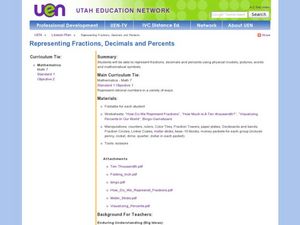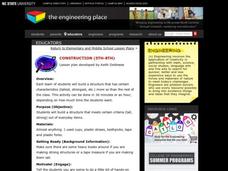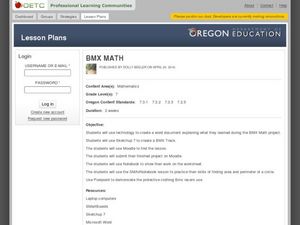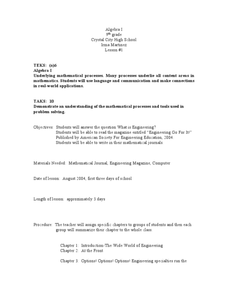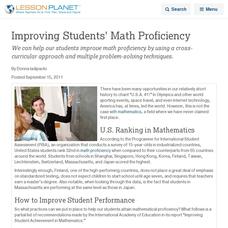Buffalo State
Adding and Subtracting Positive and Negative Integers
A well-rounded unit on positive and negative integers is a great addition to your middle school math class. Learners work through five activities, each focused on a different skill, before playing a Game of Life to practice the...
Teach Engineering
Exploring the Forces of Tension
Let the resource stretch the minds of your young scientists with a lesson plan about tensile strength and stiffness of materials. Groups consider how easily materials stretch and relate this property to engineering design.
Teach Engineering
Levers that Lift
Introduce your class to to the remaining three simple machines-- the lever, pulley, and the wheel-and-axle with a plan that includes the three different types of levers in the discussion of levers. The lesson continues with the...
Teach Engineering
May the Force Be With You: Thrust
Force the plane through the air. The lesson introduces the force on an airplane that makes it go forward. Pupils learn how Newton's laws of motion apply to flight in the eighth segment of a 22-part unit on flight.
Teach Engineering
Extinction Prevention via Engineering
It's time to save endangered species through engineering. The third lesson in a nine-part Life Science unit has young environmentalists study species extinction. An engaging discussion leads to some ideas on how to use engineering design...
Teach Engineering
Airplane Tails and Wings: Are You in Control?
Keep everything under control. The lesson, the 16th segment in a 22-part unit, provides a more detailed look at the parts of a plane, specifically the control surfaces. Pupils learn about the construction of the wings and the tails and...
Teach Engineering
Can You Take the Pressure?
Do not let the pressure get to you. The first lesson in a unit of 22 introduces the concept of air pressure. Using background knowledge, the resource gives teachers the information they need to discuss how people measure air pressure and...
Teach Engineering
Floaters and Sinkers
Whatever floats your boat. Young engineers learn about density by measuring the masses and volumes of boxes filled with different materials. Using their knowledge of densities, they hypothesize whether objects with given densities will...
Teach Engineering
Understanding Elements
Nothing says organization quite like a table. The third lesson in a six-part Mixtures and Solutions unit teaches young scientists about elements and the periodic table. They learn how the periodic table is organized and about the...
Teach Engineering
Clean it Up!
Harness the power of bacteria. Scholars see how using organisms that exist in nature can help solve human problems in the process known as bioremediation. They research and discuss several successful examples, such as using oil-eating...
Teach Engineering
The Cloning of Cells
Did you know that there are over 200 different types of cells in the human body? One type, the stem cell, is the focus of the fifth of six installments in the Cells unit. The lesson asks the class to discuss stem cells and their...
Teach Engineering
The Challenge Question
A research position becomes a modeling job. The introductory lesson in a series of nine presents the challenge of analyzing a set of bivariate data. The class brainstorms what the data may represent. Pupils must decide what is needed to...
Teach Engineering
Coordinates and the Cartesian Plane
The plot thickens to get a functional understanding. After a short review of plotting points on the coordinate plane, class members learn the difference between functions and relations in the second lesson in a series of nine. They...
Curated OER
Representing Fractions, Decimals, and Percents
In this fractions, decimals, and percents lessons, students explore various methods of representing fractions. They demonstrate situations that represent rational numbers. Students create a foldable exploring fractions, decimals and...
Curated OER
Football Math
Develop an understanding of positive and negative numbers using football. Pupils create a football field and game pieces. The teacher gives plays and the pupils move pieces to see who wins the game.
PBS
A Little Recycling Goes A Long Way
Every time you purchase something from the store, it goes into a bag, but what happens to the bag? This lesson encourages your learners to think about what happens to those plastic and paper bags and their effect on the environment. Use...
National Sailing Hall of Fame
Introduction to Sailboats
The left part of the boat is called what? An informative lesson plan and accompanying slideshow presentation introduce middle schoolers to the terminology and parts associated with a sailboat.
Curated OER
No More Traffic Jams: Lesson 3
Traffic is a very real concern for any Urban dweller. After watching a video showing various traffic issues and solutions, learners group up to discuss and develop innovative traffic solutions of their own. They explore vocabulary and...
North Carolina State University
Construction
Engineering design projects serve as great opportunities for collaborative problem solving. For this case, students work in small groups designing, building, and eventually testing a structure that meets a teacher-specified objective. It...
Curated OER
Math Instructional Technology Information
Students investigate the correlation between education and salary. In this business instructional activity, students analyze the salary rate for different jobs to determine if there is a correlation between the two. They graph their...
Curated OER
BMX Math
Students investigate circles using a BMX path. In this circles lesson, students use technology of various kinds to create a BMX track. They use Moodle to develop their lesson and as they investigate the area and perimeter of a circle....
Curated OER
Problem Solving Using Math
Students solve real life scenarios using algebra. In this word problem lesson plan, students use different websites dealing with engineering as it relates to the real world and math. They use other resources such as magazines to solve...
Curated OER
Improving Students' Math Proficiency
We can help our students improve math proficiency by using a cross-curricular approach and multiple problem-solving techniques.
Institute of Electrical and Electronics Engineers
Exploring at the Nanoscale
Nano-nano! Nanotechnology can seem like it's from another planet! After learning about this tiny technology, collaborative groups experiment with how smaller particles affect chemical reactions. They do this by immersing a whole and a...













